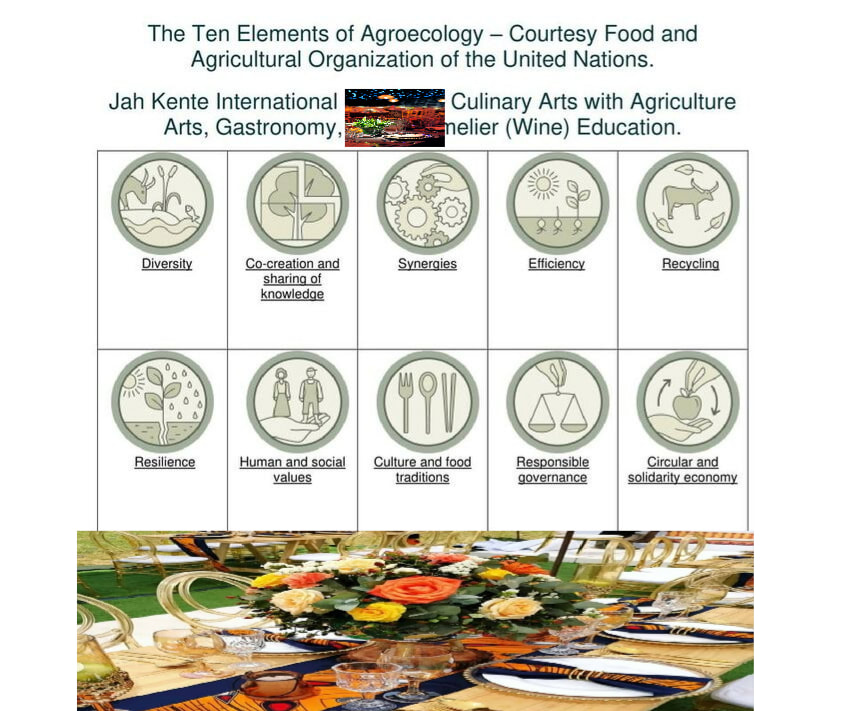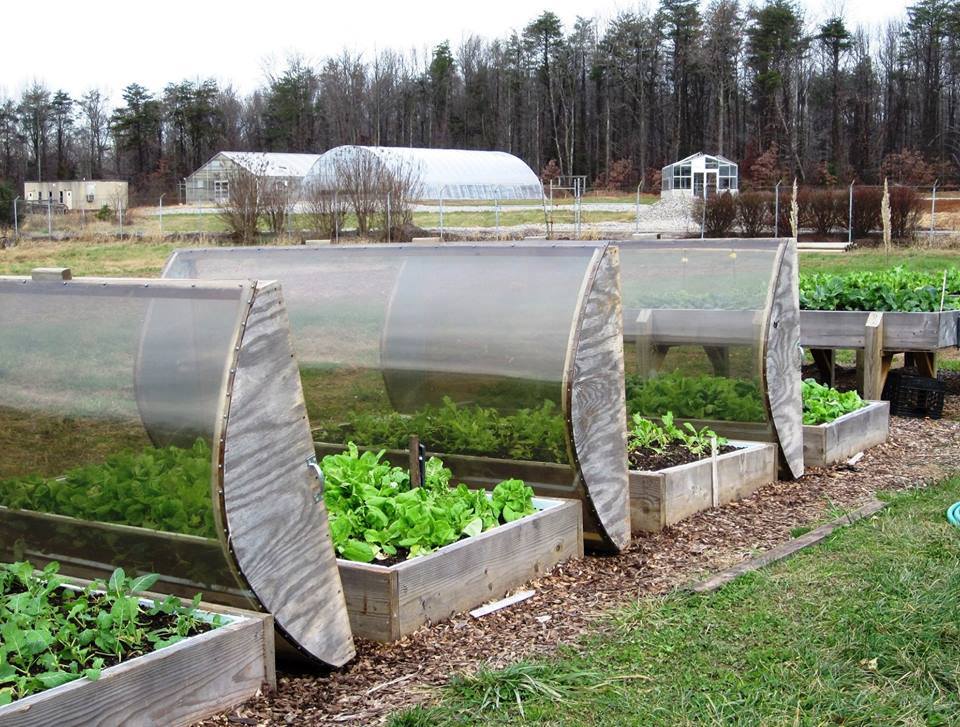Welcome to Hospitality and Culinary Arts, Arts Agriculture and Sommelier (Wine Education).
Find Your Culinary Arts Expression in the Curricula Guide.
The Jah Kente International Culinary Arts, Agriculture Arts and Sommelier
program offers intensive practical lessons. Trainees gain knowledge on basic
culinary techniques, work with various ingredients and foods, learn to handle
professional equipment, prepare a la carte meals and create menus. Over the
course of the program, the trainees acquire the skills necessary to function
with independence in a professional kitchen.
In addition to outcomes in the Course Units, trainees gain
understanding in:
1) Nutrition guidelines
2) The role of macronutrients: Carbohydrates
3) The role of macronutrients: Fats
4) The role of macronutrients: Proteins
5) Calorie balance in context
6) The role of micronutrients: Vitamins
7) The role of micronutrients: Minerals
8) Health, disease and nutrition
9) Pediatric nutrition
Course Unit 1: Agroecology and Sustainable Food Production.
Agroecology is based on applying ecological concepts and principles to
optimize interactions between plants, animals, humans, and the environment
while taking into consideration the social aspects that need to be addressed
for a sustainable and fair food system. Building synergies, agroecology can
support food production and food security and nutrition while restoring the
ecosystem services and biodiversity that are essential for sustainable
agriculture. Agroecology can play an important role in building resilience and
adapting to climate change (Food and Agricultural Organization of the
United Nations).
.
Agroecology is based on applying ecological concepts and principles to
optimize interactions between plants, animals, humans, and the environment
while taking into consideration the social aspects that need to be addressed
for a sustainable and fair food system. Building synergies, agroecology can
support food production and food security and nutrition while restoring the
ecosystem services and biodiversity that are essential for sustainable
agriculture. Agroecology can play an important role in building resilience and
adapting to climate change (Food and Agricultural Organization of the
United Nations).
.

This Unit is covered within the first week with interactive lectures, videos,
and discussions. This course will provide a good overview of sustainable food
production principles and is intended to provide sufficient information to get
started or improve your sustainable food production. It is designed to
encourage thinking in terms of climate resilience, rather than focusing on
climate change, with discussions related research and activities in the
community and beyond.
Food & Healing:: Food has powerful potential to heal the body. The
coursework fosters health- supportive qualities of ingredients and cooking
techniques and how to use them to best benefit health. Western, Soul
(African American, Caribbean, Latin American and African food theories and
applications are taught through interdisciplinary training. Nutrition and
health experts lead practical classes and lectures on topics such as
whole foods dynamics, living foods, nutrition and cooking for people in need
of special diet.
Course Unit 2:
FUNDAMENTALS OF PLANT-BASED CUISINE
This overview will address the fundamental culinary techniques and criteria
for selecting quality ingredients. It is an introduction to the foundation for
preparing health-supportive, whole-foods cuisine.
Outcomes:
1) Knife skills training. Principles of food science.
2) Culinary techniques including sauté, roast, blanch, braise and pressure
cook.
3) Exploring the health benefits, healing qualities and versatility of sea
vegetables and how to prepare them.
Course Unit 2:
GRAINS, BEANS, STEWS
In Unit 2, you will continue your career training to include a variety of
bean and grain, stock and sauce preparations. You would learn to also
prepare soups and stews highlighting whole grains, beans, vegetables and
non-dairy alternatives, and the variety of stew.
Outcomes:
1) Identifying and preparing a variety of beans in salads, purees, stews and
soups.
2) Identifying and preparing whole grains using various techniques.
3) Preparing vegan and vegetarian stocks using traditional culinary
techniques.
4) Preparing soufflés, custards and emulsified sauces. An emulsion is a
mixture of two or more liquids that are normally (unmixable or unblendable)
owing to liquid-liquid phase separation.
bean and grain, stock and sauce preparations. You would learn to also
prepare soups and stews highlighting whole grains, beans, vegetables and
non-dairy alternatives, and the variety of stew.
Outcomes:
1) Identifying and preparing a variety of beans in salads, purees, stews and
soups.
2) Identifying and preparing whole grains using various techniques.
3) Preparing vegan and vegetarian stocks using traditional culinary
techniques.
4) Preparing soufflés, custards and emulsified sauces. An emulsion is a
mixture of two or more liquids that are normally (unmixable or unblendable)
owing to liquid-liquid phase separation.
- Common examples of emulsions include egg yolk, butter, and mayonnaise.
- The process of mixing liquids to form an emulsion is called emulsification.
Course Unit 3:
POULTRY, FISH, SHELLFISH
In Unit 3, you will earn how protein sources come in a variety
of forms – both plant and animal. You will how to prepare
poultry, fish and shellfish, as well as how to prepare
in health-conscience, traditional forms.
Outcomes:
1) Identifying and preparing traditional foods.
2) Fabricating and preparing poultry, fin fish and shellfish.
3) Making food and preparing it in a variety of ways.
4) Modern plating styles and theory.
Note: Fabrication, is the process of cutting, boning, and
portioning large cuts of meat, or poultry for fish to menu specifications.
Becoming proficient at fabricating takes practice often through an
apprenticeship under a master meat cutter.
Course Unit 4:
ADVANCED CULINARY APPLICATIONS
Unit 4 prepares you in the areas of kitchen d vegetables, soups, and sauce,
pasta-making, garde manger, advanced poultry, fish, and shellfish
fabrication, advanced station/line cook, advanced garnishes and plating,
banquet and catering, and Introduction to food management
You will apply your growing command of health-supportive techniques to
preparing salads, hors d’oeuvres, pâtés and terrines, a brunch, and a buffet.
You will hone your skills at menu planning and recipe writing while exploring
career paths in personal and private cooking, catering and teaching. You will
also study theoretical approaches to the energetics of food, factors that
impact longevity, and the role of fats, protein and carbohydrates in a healthy,
whole-foods diet.
Outcomes
1) Preparing pâtés and terrines.
2) Preparing salads that showcase whole, seasonal ingredients.
3) Writing and formatting a recipe properly.
4) Learning how to design menus that are nutritious and balanced according
to the program’s criteria.
5) Preparing balanced, health-supportive brunch and buffet menus.
pasta-making, garde manger, advanced poultry, fish, and shellfish
fabrication, advanced station/line cook, advanced garnishes and plating,
banquet and catering, and Introduction to food management
You will apply your growing command of health-supportive techniques to
preparing salads, hors d’oeuvres, pâtés and terrines, a brunch, and a buffet.
You will hone your skills at menu planning and recipe writing while exploring
career paths in personal and private cooking, catering and teaching. You will
also study theoretical approaches to the energetics of food, factors that
impact longevity, and the role of fats, protein and carbohydrates in a healthy,
whole-foods diet.
Outcomes
1) Preparing pâtés and terrines.
2) Preparing salads that showcase whole, seasonal ingredients.
3) Writing and formatting a recipe properly.
4) Learning how to design menus that are nutritious and balanced according
to the program’s criteria.
5) Preparing balanced, health-supportive brunch and buffet menus.
Course Unit 5:
BAKING AND DESSERTS
Unit 5 is designed to give students a foundation to the pastry arts. The unit combines
lectures, demonstrations, baking, and evaluation for an integrated approach to the
pastry arts. The quality of baking and desserts can benefit from using ingredients
that are more natural, unprocessed and whole.
You can convert conventional baking recipes to alternatives featuring whole-grain
flours and less-refined sweeteners, without sacrificing taste or texture. You will also
prepare baked goods and desserts that meet special dietary needs, such as vegan,
gluten-free and dairy-free.
Outcomes:
1) Preparing pies, tarts and galettes using vegan ingredients.
2) Baking and decorating a variety of cakes.
3) Preparing vegan cookies, puddings and ice creams.
4) Preparing flourless desserts.
5) Understanding how to utilize sugar, butter and white flour
alternatives.
As a cake designer, you will be creating centerpieces that can be the most
memorable and precious events of the beholders’ lives You have the power of
creativity and the satisfaction of translating their wish to the moment of
reality.
As part of this Unit, you will design, bake and decorate creations that are
almost as much appealing at sight as they are to eat. You might choose to
specialize in a style or theme of cake decorating, such as gum paste flowers,
marzipan figurines, royal icing, fondant cut-outs, or intricately piped
buttercream lacework or roses, contemporary cake decorating, from the
basics of piping, advanced sugar work and hand-sculpting to airbrushing,
hand-painting and novelty cakes.
Outcomes:
1) How to prepare and apply drips to cakes.
2) Painting on cakes using buttercream.
3) Decorating cakes with meringues, buttercream flowers, sugar art and more.
4) Piping different styles of buttercream borders onto your cakes.
5) Using sprinkles to decorate the top, sides and insides of your cakes.
6) Sponge painting with buttercream and gel food colors.
7) Painting on cakes with paintbrushes and gel food colors.
8) Decorating cakes with fresh and artificial flowers.
9) Making and using stencils.
10) How to frost a cake with decoration.
Course Unit 6:
BREAD AND PASTA
As you continue to explore the art and science of baking, you will focus on
yeasted breads, quick breads, pizza and focaccia with wheat-free and gluten-
free options. This course also includes pasta making.
Outcomes:
1) Preparing quick breads, scones, pancakes, crêpes, waffles and biscuits.
2) Preparing hearth and pan breads.
3)Preparing assorted African bread, including injera (Ethiopian specialty),
chapati (East African bread); West African puff-puff; Moroccan pita bread,
green mealie bread in Southern Africa.
4) Using alternative flours and ingredients in bread baking.
4)Preparing ravioli, tortellini, fettucine and gnocchi.
5) Preparing appetizers, entrees and desserts to order.
yeasted breads, quick breads, pizza and focaccia with wheat-free and gluten-
free options. This course also includes pasta making.
Outcomes:
1) Preparing quick breads, scones, pancakes, crêpes, waffles and biscuits.
2) Preparing hearth and pan breads.
3)Preparing assorted African bread, including injera (Ethiopian specialty),
chapati (East African bread); West African puff-puff; Moroccan pita bread,
green mealie bread in Southern Africa.
4) Using alternative flours and ingredients in bread baking.
4)Preparing ravioli, tortellini, fettucine and gnocchi.
5) Preparing appetizers, entrees and desserts to order.
Course Unit 7:
FOOD AND HEALING 1 AND ADVANCED CULINARY TECHNIQUES
The link between diet, lifestyle and wellness is well-established, and this
course will provide perspectives on this relationship by looking at
cardiovascular system health, the microbiome and detoxification systems. On
the culinary aspect, you ill prepare food for retreat and specialty occasion.
You will also focus on improvisational cooking using seasonal ingredients and
developing a vegan, four-course banquet project.
Outcomes
1)Improvisational cooking.
2) Preparing spa and retreat cuisine.
3) Preparing raw foods.
4) Recipe costing and testing.
course will provide perspectives on this relationship by looking at
cardiovascular system health, the microbiome and detoxification systems. On
the culinary aspect, you ill prepare food for retreat and specialty occasion.
You will also focus on improvisational cooking using seasonal ingredients and
developing a vegan, four-course banquet project.
Outcomes
1)Improvisational cooking.
2) Preparing spa and retreat cuisine.
3) Preparing raw foods.
4) Recipe costing and testing.
Course Unit 8:
FOOD AND HEALING 2
AFRICAN, CARIBBEAN AND WORLD CUISINES
This course extends the emphasis on integrative health as it explores food and the
immune system, kitchen pharmacy, diets designed to promote wellness and
treatment support, Ayurveda, and Macrobiotics.
You will prepare world cuisine with specialty dishes from Africa, Caribbean, Latin
America, and African, American Soul food as well as notable cuisines from around
the world served in high end restaurants Washington, DC.
Outcomes:
1) Prepare dishes and meals designed to boost immunity.
2) Prepare Macrobiotic cuisine and explain the choice. The focus of the
macrobiotic diet is preventing disease, managing disease and optimizing
health
3) Prepare Ayurvedic cuisine. An Ayurvedic diet is an eating plan that provides
guidelines for when you eat, what you eat, and how you eat to boost your health,
prevent or manage disease, and maintain wellness.
4) Prepare world cuisine menus.
5) Present a sit-down four-course buffet or sit down dinner.
immune system, kitchen pharmacy, diets designed to promote wellness and
treatment support, Ayurveda, and Macrobiotics.
You will prepare world cuisine with specialty dishes from Africa, Caribbean, Latin
America, and African, American Soul food as well as notable cuisines from around
the world served in high end restaurants Washington, DC.
Outcomes:
1) Prepare dishes and meals designed to boost immunity.
2) Prepare Macrobiotic cuisine and explain the choice. The focus of the
macrobiotic diet is preventing disease, managing disease and optimizing
health
3) Prepare Ayurvedic cuisine. An Ayurvedic diet is an eating plan that provides
guidelines for when you eat, what you eat, and how you eat to boost your health,
prevent or manage disease, and maintain wellness.
4) Prepare world cuisine menus.
5) Present a sit-down four-course buffet or sit down dinner.
WINE: SOMMELIER EDUCATION.
.Program Aims The aim of the program is to give trainees a specialist
knowledge and understanding of the core principles of production and
business of wine. The successful trainee will have the product knowledge
and the analytical tasting skills to explain and evaluate wines. The program is
adapted from the Wset diploma course. This program introduces youths in
the District of Columbia who choose this path to the complex and vast wine
industry, paving the way for a potential future in the global wine world. The
wine industry in the US alone employs over 1.5 million people and has an
economic impact of $220 billion dollars. Trainees may have the opportunity
to observe the DC urban winery in the Navy Yard along the Anacostia River.
Program Structure: The program is divided into six mandatory Units. The two
foundation Units, P1 and P2, must be examined at the beginning of the
programme because they will provide the knowledge and understanding
required for success in subsequent Units.
.Program Aims The aim of the program is to give trainees a specialist
knowledge and understanding of the core principles of production and
business of wine. The successful trainee will have the product knowledge
and the analytical tasting skills to explain and evaluate wines. The program is
adapted from the Wset diploma course. This program introduces youths in
the District of Columbia who choose this path to the complex and vast wine
industry, paving the way for a potential future in the global wine world. The
wine industry in the US alone employs over 1.5 million people and has an
economic impact of $220 billion dollars. Trainees may have the opportunity
to observe the DC urban winery in the Navy Yard along the Anacostia River.
Program Structure: The program is divided into six mandatory Units. The two
foundation Units, P1 and P2, must be examined at the beginning of the
programme because they will provide the knowledge and understanding
required for success in subsequent Units.
| wine_education_-_jah_kente_international.pdf | |
| File Size: | 856 kb |
| File Type: | |



